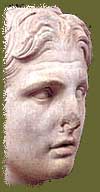Titulary
| Horus Name | Mekkemet |
| Nebty Name | |
| Golden Horus Name | |
| Praenomen | Setepenre Meryamun "Chosen of Re, Beloved of Amun" |
| Nomen | Alexander |
| Alternate Names | Alexandros, Alexander III |
| all | 332-323 |
| Predecessor | Darius III, 31st Dynasty |
| Successor | Philip II Arrhideaus |
| Father | Philip II of Macedonia |
| Mother | Olympias, daughter of a ruler of Molossos |
| Wife | Roxan |
| Alexandria, but not yet found |
| City of Alexandria |
Alexander the Great came to Egypt in 336 and defeated the last of the Persian pharaohs, Darius III. At the time, the Persians were the primary enemy of the Greeks. When he defeated Darius, he was welcomed by the Egyptians and he was crowned as pharaoh in the same year in Memphis. In the following year, he visited the oracle of Amun in Siwa and was declared a "son of Amun". As a result, he founded the Egyptian city of Alexandria on 7 Apr 331 BCE. Almost immediately, he left Egypt to return to Babylon. He never saw the city he founded.
 Initially, he left Cleomenes of Naukratis in control of the territory of Egypt. later this position would be filled by Ptolemy. When Alexander died,, Egypt was left in the able hands of two administrators, Doloaspis and Pietesis).
Initially, he left Cleomenes of Naukratis in control of the territory of Egypt. later this position would be filled by Ptolemy. When Alexander died,, Egypt was left in the able hands of two administrators, Doloaspis and Pietesis).

 Alexander was the son of Philip II of Macedonia, king of the Macedonian Empire. However, Alexander the Great overshadowed his father, and is one of the better-known men in history. He ruled over a vast empire, having defeated the persians, the egyptians and others in the region. He died in 323 BC at the age of 33 in Babylon after conquering the Persian empire all the way to westernmost India.
Alexander was the son of Philip II of Macedonia, king of the Macedonian Empire. However, Alexander the Great overshadowed his father, and is one of the better-known men in history. He ruled over a vast empire, having defeated the persians, the egyptians and others in the region. He died in 323 BC at the age of 33 in Babylon after conquering the Persian empire all the way to westernmost India.
According to the records, he was originally to be buried in Macedonia, but Ptolemy intercepted his body and had him buried in Egypt. His body was mummified and placed in a tomb in Alexandria, his namesake city. The tomb was still visible in Roman times, but the location is unknown today.
pharaohs